#the autobiography of jane eyre
Explore tagged Tumblr posts
Text










♪ Being a ghost, soliloquies, doll tea parties. Then I'll etch Jane Eyre's sketch, drink some wine, rip a dress! ♪
Bertha's Attic Song (2014) [x]
Bonus:

#bertha's attic song#jane eyre#perioddramaedit#sinead persaud#shipwrecked comedy#charlotte bronte#tangled#when will my life begin#userthing#witchesnet#entsource#femalecharacters#usercreate#bronteedit#janeeyreedit#the autobiography of jane eyre#my edits#berthasatticsongedit#10 years of shipwrecked
89 notes
·
View notes
Text
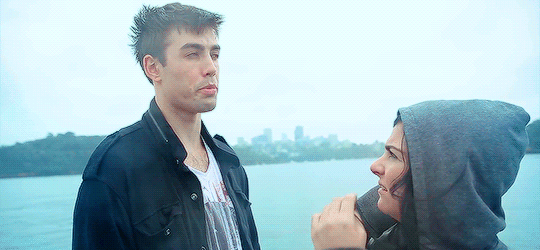

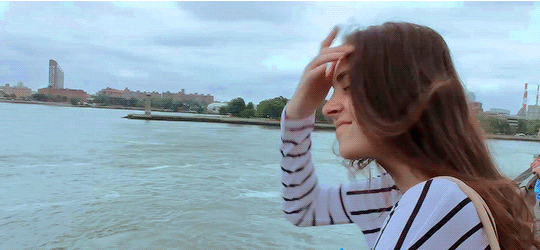
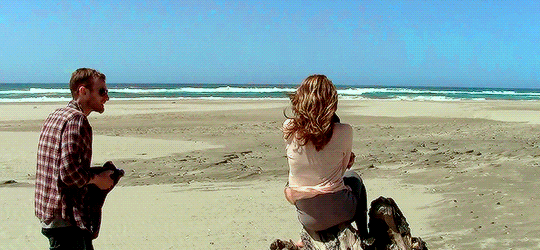


giftober 2023 | day 7: water
call me katie / project green gables / twelfth grade (or whatever) / project dashwood / the autobiography of jane eyre / lovely little losers
#giftober#call me katie#project green gables#twelfth grade (or whatever)#project dashwood#the autobiography of jane eyre#lovely little losers#katie minola#peter glover#anne shirley (project green gables)#gilbert blythe (project green gables)#liv belcik#marianne dashwood (project dashwood)#brandon crieff#jane eyre#beatrice duke#*#im going out of order its fine#giftober2023
34 notes
·
View notes
Text
At home:
youtube


Incorrect Quotes: Jane Eyre (70/?)
Source
#🎵 once she is married my attic we can share 🎵#jane eyre#jane eyre (2011)#charlotte bronte#jane and rochester#bertha's attic song#when will my life begin#shipwrecked comedy#classic literature#with her nose stuck in a book#user obscurelittlebird#the autobiography of jane eyre#proposal
6K notes
·
View notes
Text
the way i miss the fanmix and gif edits era of the liw fandom
#arise from the dead i beg#the lizzie bennet diaries#nothing much to do#the roedell project#autobiography of jane eyre#public history#demi & ace#project green gables#green gables fables#literary inspired web series#liw#tagging the biggest liw for reach#but seriously#yall can we get back into fanmixes i BEG
11 notes
·
View notes
Text
In 1847 the stereotypes for male and female writers were very rigid. Critics expected from a male writer strength, passion, and intellect, and from a woman writer they expected tact, refinement, and piety. They depended on these stereotypes so much, in fact, that they really didn't know how to proceed, what to say, or what to look for in a book if they were unsure of the author's sex.
So Jane Eyre created a tremendous sensation, and it was a problem for the Brontës. The name Currer Bell could be that of either a man or a woman and the narrator of Jane Eyre is Jane herself. The book is told as an autobiography. These things suggested that the author might have been a woman. On the other hand, the novel was considered to be excellent, strong, intelligent and, most of all, passionate. And therefore, the critics reasoned, it could not be written by a woman, and if it turned out that it was written by a woman, she had to be unnatural and perverted.
The reason for this is that the Victorians believed that decent women had no sexual feelings whatsoever—that they had sexual anesthesia. Therefore, when Jane says about Rochester that his touch "made her veins run fire, and her heart beat faster than she could count its throbs," the critics assumed this was a man writing about his sexual fantasies. If a woman was the author, then presumably she was writing from her own experience, and that was disgusting. In this case we can clearly see how women were not permitted the authority of their own experience if it happened to contradict the cultural stereotype.
But even more shocking than this to the Victorians was Jane's reply to Rochester, a very famous passage in the novel. He has told her he is going to marry another woman, an heiress, but that she can stay on as a servant. Jane answers him thus:
"I tell you I must go," I retorted, roused to something like passion. "Do you think I can stay to become nothing to you? Do you think I am an automaton, a machine without feeling and can bear to have my morsel of bread snatched from my lips and my drop of living water dashed from my cup? Do you think because I am poor, obscure, plain and little, I'm soulless and heartless? You think wrong. I have as much soul as you and full as much heart. And if God had gifted me with some beauty and much wealth, I should've made it as hard for you to leave me as it is now for me to leave you. I am not talking to you now through the medium of custom, conventionality, nor even of mortal flesh. It is my spirit that addresses your spirit, just as if both had passed through the grave and we stood at God's feet equal—as we are."
This splendid assertion violated not only the standards of sexual submission, which were believed to be women's duty and their punishment for Eve's crime, but it also went against standards of class submission, and obviously against religion. And this sort of rebellion was not feminine at all.
The reviews of Jane Eyre in 1847 and 1848 show how confused the critics were. Some of them said Currer Bell was a man. Some of them, including Thackeray, said a woman. One man, an American critic named Edgar Percy Whipple, said the Bells were a team, that Currer Bell was a woman who did the dainty parts of the book and brother Acton the rough parts. All kinds of circumstantial evidence were adduced to solve this problem, such as the details of housekeeping. Harriet Martineau said the book had to be the work of a woman or an upholsterer. And Lady Eastlake, who was a reviewer for one of the most prestigious journals, said it couldn't be a woman because no woman would dress her heroines in such outlandish clothes.
Eventually Charlotte Brontë revealed her identity, and then these attacks which had been general became personal. People introduced her as the author of a naughty book; they gossiped that she was Thackeray's mistress. They speculated on the causes of what they called "her alien and sour perspective on women." She felt during her entire short life that she was judged always on the basis of what was becoming in femininity and not as an artist.
-Elaine Showalter, ‘Women Writers and the Female Experience’ in Radical Feminism, Koedt et al (eds.)
#elaine showalter#charlotte bronte#jane eyre#sex roles#female writers#women’s history#women in literature#victorian
1K notes
·
View notes
Text
Lucian's Library
Feel free to suggest never written books you wish you could read.
#Canterbury Tales#Geoffrey Chaucer#Douglas Adams#Sanditon#Jane Austen#Emily Brontë#Unreality#Virginia Woolf#Jane Eyre#Charlotte Brontë
210 notes
·
View notes
Text
Thoughts while rereading Jane Eyre
I first read Jane Eyre in its entirety when I was in high school, and it has remained one of my all-time favorite books! After reading the Manga Classics adaptation and seeing both the old and new editions of the stage musical, I finally reread it, or rather listened to the audiobook.
These were my thoughts on this reading (with spoilers):
~ Jane’s autobiography begins with the line, “There was no possibility of taking a walk that day.” I take this to mean that if she had taken a walk that day, none of the following events would have happened! John Reed would not have attacked her at that time and place, leading to her traumatic punishment, her meeting with Mr. Lloyd, and going to Lowood Institution.
~ Charlotte Bronte vividly shows the intensity of children’s emotions. I don’t think that was common in British literature at the time!
~ Jane enters and leaves the lives of the Reeds, the Thornfield residents, and the Rivers siblings in very Gothic fashions! I can imagine parts of the story being told from other characters’ perspectives to great dramatic effect.
~ Knowing the whole story, there are many seeds of foreshadowing to be found throughout the story! Great setup and payoff.
~ Jane says about Helen’s grave, “for fifteen years after her death it was only covered by a grassy mound; but now a grey marble tablet marks the spot.” Jane must have gone back to Lowood when she was about 25, and paid for a fitting monument for her first and life-changing friend!
~ Pilot seems almost like a Disney hero’s sidekick, urging the two love interests to meet each other!
~ Mr. Rochester seems to judge Jane’s character partly by observing how she treats Pilot and Adele, and the contrast against Blanche Ingram’s treatment of them!
~ If Eliza and Georgiana are supposed to represent the extremes of unfeelingness and too effusive feelings, are they basically Eleanor and Marianne Dashwood? I know Charlotte Bronte disliked Pride and Prejudice; maybe she was pushing back against Austen’s other characters too?
~ Rochester actually calls Jane the “adopted daughter” of Mrs. Fairfax and “little English mother” of Adele! I wish this familial dynamic had been brought out more.
~ The impulsive way Jane flees from Thornfield reminds me that she is still a teenager! She does not think of the fact that she has an uncle who wants to give her an inheritance, or of the solicitor’s advice to stay put until she hears news of him. She does not seek help from Mrs. Fairfax or the Leavens family to find a new situation. She might have spared herself a lot of suffering if she had formed a better plan for finding a new home and had her mail forwarded there!
~ St. John, Diana, and Mary Rivers are like a reversed reflection of John, Eliza, and Georgiana Reed—both sets of cousins, but completely opposite dynamics with Jane.
~ Jane’s relationship with St. John Rivers is waaaay more toxic than her relationship with Edward Rochester. Jane can stand her ground with Rochester, who would never force her to do anything she decidedly did not want; but she feels compelled to do whatever St. John tells her, and he urges her to do things against her own desires.
~ Rochester literally loses his eye and hand, just like Jesus says about temptation in Matthew 18:8-9!
~ Jane and Rochester’s relationship is bookended by scenes of her supporting him as he walks!
~ Were the parson and clerk who officiated Jane and Rochester’s marriage the same ones who were at the interrupted wedding?! Unless there was a change in position during the year of separation, they probably were the same ones!
~ My headcanon is that all the Thornfield servants placed bets on how long it would take Jane and Rochester to work things out. This is supported by the innkeeper’s account of how the servants observed Jane and Rochester, and John and Mary’s reactions after they finally get married!
#Jane Eyre#Edward Fairfax Rochester#Charlotte Bronte#literary analysis#character analysis#headcanons#my headcanons
34 notes
·
View notes
Text
the problem is that piper belongs in a late 90s/early 2000s grungy character-driven tv drama (my so called life, freaks and geeks, dawson’s creek, daria) and hazel belongs in a subversive gothic novel (jane eyre, passing, autobiography of my mother, wide sargasso sea) and jason belongs with the original argonauts. i think rick did understand this on some level but had trouble incorporating this into his own writing style.
#piper#hazel#jason#idk if jason rly belongs there tbh. remember when the series was going to be based on the argonauts and the trojan war....nvm he does.#that would have fucking ruled
11 notes
·
View notes
Text
How many have you read out of the hundred?
Me: 64/100
Reblog & share your results
1. "Pride and Prejudice" by Jane Austen
2. "Crime and Punishment" by Fyodor Dostoevsky
3. "To Kill a Mockingbird" by Harper Lee
4. "1984" by George Orwell
5. "Great Expectations" by Charles Dickens
6. "One Hundred Years of Solitude" by Gabriel García Márquez
7. "Jane Eyre" by Charlotte Brontë
8. "The Catcher in the Rye" by J.D. Salinger
9. "War and Peace" by Leo Tolstoy
10. "The Great Gatsby" by F. Scott Fitzgerald
11. "Moby-Dick" by Herman Melville
12. "The Odyssey" by Homer
13. "Wuthering Heights" by Emily Brontë
14. "Anna Karenina" by Leo Tolstoy
15. "The Brothers Karamazov" by Fyodor Dostoevsky
16. "The Iliad" by Homer
17. "Frankenstein" by Mary Shelley
18. "Les Misérables" by Victor Hugo
19. "Don Quixote" by Miguel de Cervantes
20. "Middlemarch" by George Eliot
21. "The Picture of Dorian Gray" by Oscar Wilde
22. "The Scarlet Letter" by Nathaniel Hawthorne
23. "Dracula" by Bram Stoker
24. "Sense and Sensibility" by Jane Austen
25. "The Hunchback of Notre-Dame" by Victor Hugo
26. "The War of the Worlds" by H.G. Wells
27. "The Grapes of Wrath" by John Steinbeck
28. "The Canterbury Tales" by Geoffrey Chaucer
29. "The Portrait of a Lady" by Henry James
30. "The Jungle Book" by Rudyard Kipling
31. "Siddhartha" by Hermann Hesse
32. "The Divine Comedy" by Dante Alighieri
33. "A Tale of Two Cities" by Charles Dickens
34. "The Trial" by Franz Kafka
35. "Mansfield Park" by Jane Austen
36. "The Three Musketeers" by Alexandre Dumas
37. "Fahrenheit 451" by Ray Bradbury
38. "Gulliver's Travels" by Jonathan Swift
39. "The Sound and the Fury" by William Faulkner
40. "Emma" by Jane Austen
41. "Robinson Crusoe" by Daniel Defoe
42. "Tess of the d'Urbervilles" by Thomas Hardy
43. "The Republic" by Plato
44. "Heart of Darkness" by Joseph Conrad
45. "The Hound of the Baskervilles" by Arthur Conan Doyle
46. "The Strange Case of Dr Jekyll and Mr Hyde" by Robert Louis Stevenson
47. "The Prince" by Niccolò Machiavelli
48. "The Metamorphosis" by Franz Kafka
49. "The Old Man and the Sea" by Ernest Hemingway
50. "Bleak House" by Charles Dickens
51. "Gone with the Wind" by Margaret Mitchell
52. "The Plague" by Albert Camus
53. "The Joy Luck Club" by Amy Tan
54. "The Master and Margarita" by Mikhail Bulgakov
55. "The Red and the Black" by Stendhal
56. "The Sun Also Rises" by Ernest Hemingway
57. "The Fountainhead" by Ayn Rand
58. "The Bell Jar" by Sylvia Plath
59. "The Idiot" by Fyodor Dostoevsky
60. "The Book Thief" by Markus Zusak
61. "The Return of Sherlock Holmes" by Arthur Conan Doyle
62. "The Woman in White" by Wilkie Collins
63. "Things Fall Apart" by Chinua Achebe
64. "Treasure Island" by Robert Louis Stevenson
65. "Ulysses" by James Joyce
66. "Uncle Tom's Cabin" by Harriet Beecher Stowe
67. "Vanity Fair" by William Makepeace Thackeray
68. "Waiting for Godot" by Samuel Beckett
69. "Walden Two" by B.F. Skinner
70. "Watership Down" by Richard Adams
71. "White Fang" by Jack London
72. "Wide Sargasso Sea" by Jean Rhys
73. "Winnie-the-Pooh" by A.A. Milne
74. "Wise Blood" by Flannery O'Connor
75. "Woman in the Nineteenth Century" by Margaret Fuller
76. "Women in Love" by D.H. Lawrence
77. "Zen and the Art of Motorcycle Maintenance" by Robert M. Pirsig
78. "The Aeneid" by Virgil
79. "The Age of Innocence" by Edith Wharton
80. "The Alchemist" by Paulo Coelho
81. "The Art of War" by Sun Tzu
82. "The Autobiography of Benjamin Franklin" by Benjamin Franklin
83. "The Awakening" by Kate Chopin
84. "The Big Sleep" by Raymond Chandler
85. "The Bluest Eye" by Toni Morrison
86. "The Caine Mutiny" by Herman Wouk
87. "The Cherry Orchard" by Anton Chekhov
88. "The Chosen" by Chaim Potok
89. "The Christmas Carol" by Charles Dickens
90. "The City of Ember" by Jeanne DuPrau
91. "The Clue in the Crumbling Wall" by Carolyn Keene
92. "The Code of the Woosters" by P.G. Wodehouse
93. "The Color Purple" by Alice Walker
94. "The Count of Monte Cristo" by Alexandre Dumas
95. "The Crucible" by Arthur Miller
96. "The Crying of Lot 49" by Thomas Pynchon
97. "The Da Vinci Code" by Dan Brown
98. "The Death of Ivan Ilyich" by Leo Tolstoy
99. "The Decline and Fall of the Roman Empire" by Edward Gibbon
100. "The Divine Secrets of the Ya-Ya Sisterhood" by Rebecca Wells
#book#booklr#books#classical literature#classic academia#penguin clothbound classics#classical books#english literature#listing#that's bloody#william shakespeare#shakespeare#anne frank#the odyssey#the divine comedy#french#literature
13 notes
·
View notes
Text
Yuletide Recs, Batch Three
16 recs for The Eagle, Earthsea, Emma., The Expanse, The Faculty, The Fall of the House of Usher, Fallen London, The Green Knight, The Handmaiden, Jane Eyre, King Arthur: Legend of the Sword, and The Matrix
Between Two Rivers, Marcus Flavius Aquila & Esca Mac Cunoval
Two rivers. Two near kisses.
The White Ladies of the Ring, Penthe/Tenar
There was a sorcerer imprisoned in the Labyrinth, and Arha had told Kossil that she would kill him—but she did not want to. Perhaps she needed to ask someone for help...
My Queen Bee, George Knightley/Emma Woodhouse
Emma went on, brightly, “I have spoken with Harriet about it.” George blinked. He was fast losing his grip on this conversation.
We aren't righteous (or: five times Amos did as Naomi asked, and one time he didn't.), Gen, Amos Burton & Naomi Nagata
For EdosianOrchids901 for Yuletide, who asked for Amos and Naomi and suggested something pre-canon, something about that dynamic where he sees her as an external moral compass, and how their friendship developed. This is mostly pre-canon, overlapping with canon in the last two parts. (Also it's been a while since I've seen this so apologies in advance if I've missed something in research and inadvertently contradicted canon on their immediate pre-canon backstories!)
Pyriscence, Gen, Amos Burton & Praxidike Meng
After the war with the Free Navy, Amos comes to see Prax.
What do you do when you survive a shape-shifting mind-controlling alien as a teen?, Stokely Mitchell/Stan Rosado
Twenty years later, Stokely and Stan arrive back in each other's lives.
the miraculous lustre of her eye, Madeline Usher/Verna
"If she wants Madeline fucking Usher, she's going to have to look me straight in the eyes."
a wild weird clime that lieth, sublime, Gen, Verna + Arthur Pym
Arthur Pym's first meeting with Verna.
The Margin, Gen, Verna + Arthur Pym
“We have to go back,” Arthur Pym said, teeth rattling in the wind. He clutched the ragged edges of his coat closer. “Ship can’t break through that ice. We’ll founder.” -- The first time Verna and Arthur met, on the Transglobe Expedition.
by such dreaming high, Gen, The Duchess + The Roseate Queen
It is summer, in a fallen city; and someone, somewhere, is doing something unwise...
The Half-Seen Door, Gen, Piranesi | Matthew Rose Sorensen + Sixteen | Sarah Raphael + Gawain
It’s a hard job, coming home.
leverage and its utility, Fujiwara + Original Female Character(s)
The three he smoked in the carriage ride here was nothing but a gamble. A roll of the die, a flip of a coin, a dealing of cards. Lucky for him, luck is in his favor.
lilacs out of the dead land, Jane Eyre/Edward Rochester
I had, within me, that rich world of imagination that I could always retreat to, and so I transformed myself.
All Earthly Happiness, Jane Eyre/Edward Rochester
Reader, I lied. Or, rather, I omitted. As the mother of daughters, who had openly declared their intentions of reading my autobiography, I was hesitant to paint a full picture of the course of my first engagement to my dear Edward. Although in many ways it did progress much as I described, discretion prevented absolute disclosure
When It's Worth It, Gen, Arthur + The Mage
The chilly air tasted of dust and lightning strikes and the faint iron tang of blood, and there were still all too many questions lingering unanswered.
dissolved girl, Neo/Trinity
What if Trinity came back wrong? A post-Matrix Resurrections fic about what happens if the body was rebuilt again, and again, and again, and in the remaking, became something new.
#yuletide#yuletide 2023#the eagle#earthsea#emma#emma.#the expanse#the faculty#the fall of the house of usher#fallen london#the green knight#the handmaiden#jane eyre#king arthur#king arthur legend of the sword#the matrix
14 notes
·
View notes
Text
tagged by the incomparable @briarhips to post nine book recs <3 sorry so many of these are classics im going thru smth
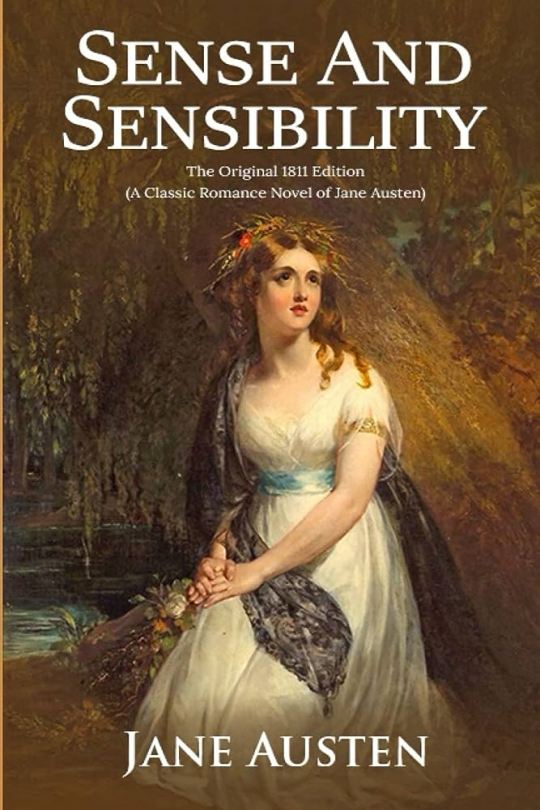

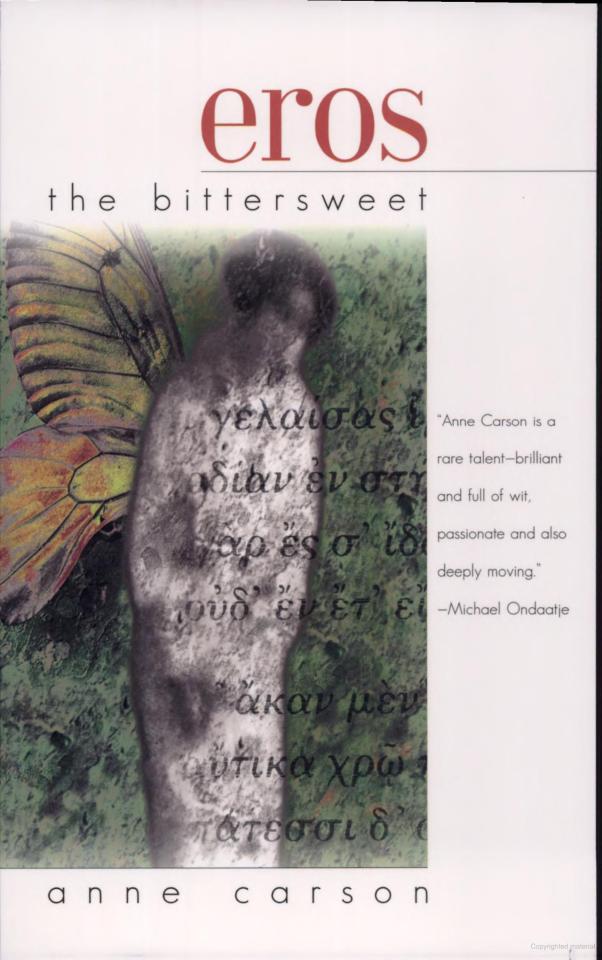

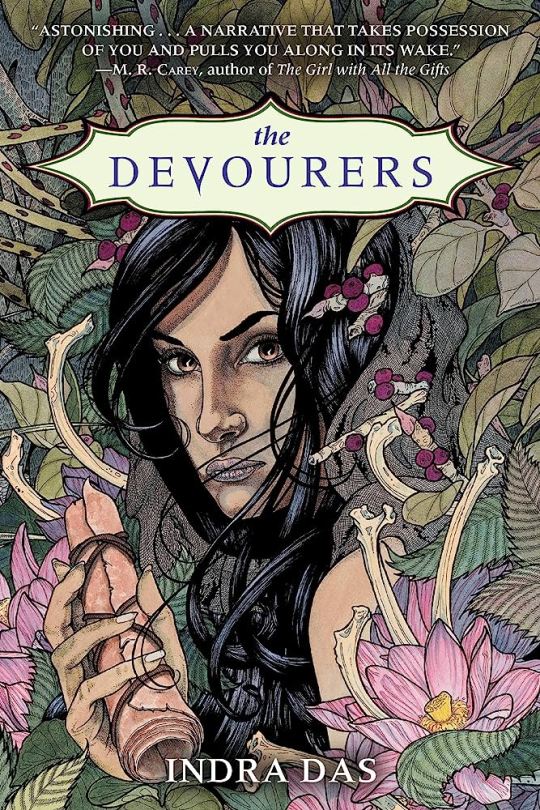
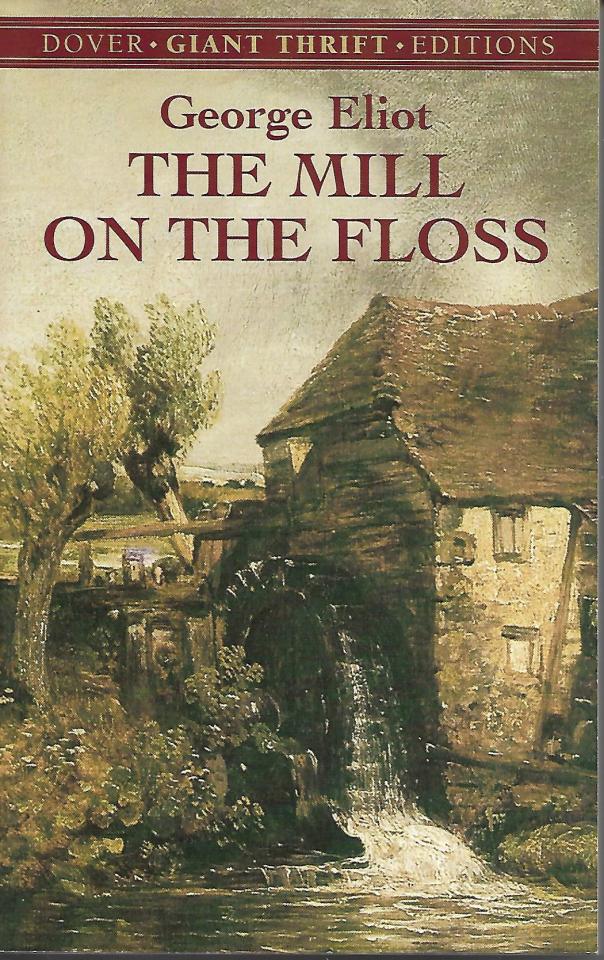
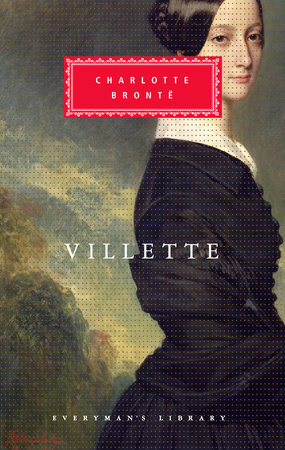


Sense and Sensibility, Jane Austen: This is MY Austen of choice. I'm doing a reread atm and it's very Emma in it's social commentary but this is THEE eldest daughter book of all time. Maybe I just like when characters are super repressed but if you want to see a woman (who has spent 200 pages being soooo hinged) have the most cathartic breakdown about it......
Identitti, Mithu Sanyal: For fans of Kuang's Yellowface who want a bit more of an academic lens! Our main character, a 2nd gen Indian-German woman, spends years of her life in the trenches of postcolonial study under a seemingly Indian woman who is then exposed as white. It doesn't give you any easy answers but it provides a lot of scholarly resources and leaves a lot of space to come to your own conclusions. Read it on a plane. Kinda fire.
Eros the Bittersweet, Anne Carson: We all know Carson. But I'm picking a nonfiction essay instead of Autobiography of Red or her translations mostly because this one takes you behind the curtain of a lot of her famous translations when it comes to the aspect of love. I'm not really nonfiction girl in general but this was worth it
Chain Gang All Stars, Nana Kwame Adjei-Brenyah: Speculative abolitionist fiction! Set in a near future where prisoners can compete in death matches to try and win their freedom. I've honestly read nothing like this...ever, like it's in a league of it's own but if you're a fan of the way footnotes were used in something like Babel you're gonna wanna check this out. Multiple povs (really interesting pov switching from a craft perspective actually) overlap to paint a stark and realistic depiction of American prisons.
The Devourers, Indrapramit Das: This was described to me as "IWTV but with werewolves and in Mughal India and actually really good" and while that's a pretty comprehensive plot summary it does not even begin to cover the shit this novel goes through. This is a book about transformation and stories and what letting a story live in you can do for you. The werewolves are kinda obviously a genderqueer allegory as well (as they often are in sff lmao) but when the interviewer himself starts talking about gender in his experiences you can see how that changes the story he's transcribing and it's just very cool. Heavy trigger warnings on this one though. Don't read if you can't handle a bit of piss (they are wolves). Writing style wise feels very similar to the magical realism of The Hungry Tide if that's ur bag
The Mill on the Floss, George Eliot: In the way that s&s is my Austen, this is MY Eliot. A classic story about women of this era who cannot fit into the boxes society lays out for them. A failed romance brands the main character an outcast in their town in a way that is. Hear me out. Fucking Utenaesque. Follow for some classic tragedy and themes of water....I would compare this more with like Dickens Bleak House than Austen though.
Villette, Charlotte Bronte: Once again. MY Bronte. Maybe it's just cause I read this before Jane Eyre but literally I do not understand why Miss Eyre gets so much more love than my girl Lucy. In broad strokes the story is about an English girl who ends up having to support herself by moving to France and becoming an English teacher at a girls boarding school. She's also plagued by a terrifying apparition of a nun, because this is Charlotte we're talking about and there's a bit of Catholic v Protestant thing going on. I read this during the very early pandemic and let me tell you some of the descriptions of isolation and loneliness are soooooo. yeah.
Monstrous Regiment, Terry Pratchett: Listen. Like, listen. It's that good. I wouldn't put a discworld novel up against fucking chain gang all stars unless it was THAT good. This is a classic 'girl dresses up as a boy and goes to war to find her brother' story. It definitely started as a commentary on folk songs/stories but it is at it's heart a novel long criticism of imperialism, nationalism, and organized religion (there's jokes though it's funny). Also not to be that guy when it comes to LGBTQ book recs but the thing came out in 2002 and it's surprisingly thoughtful when it comes to both gender and sexuality. You do not have to be a fantasy fan or a discworld fan to read this. If you gave Pratchett a try and didn't like it i STILL insist you give MR a shot. It is in a league of it's own.
Wives and Daughters, Elizabeth Gaskell: Do not be scared off by the sheer length of this one. It's fucking silly. This is one of my faaaaaaaave 1800s novels about class. We have juxtaposition between Molly's family (her father is a gentleman but a working doctor) and the landed gentry but also this divide between the uneducated Squire and his Cambridge bound sons and another one with the 'new money' gentry. There's also quite a lot of early science and anthropology documented in this (Gaskell and Darwin were besties) if that's interesting to you. WARNING: SHE DIED BEFORE SHE FINISHED THIS. ITS LIKE 99% DONE THOUGH
This was a hard list to narrow down but I have to include (at least as honorable mentions): Ling Ma's Severance/Bliss Orange, Cixin Liu's Three Body Problem and the SFF POC anthology New Suns
tagging: @weltonreject @bronskibeet @gaymersrights @orchidreign @brechtian + any and all mutuals i know ive forgotten <3
12 notes
·
View notes
Text
"Unveiling the Depths of the Soul: A Profound Exploration of 'Jane Eyre: An Autobiography' by Charlotte Brontë"
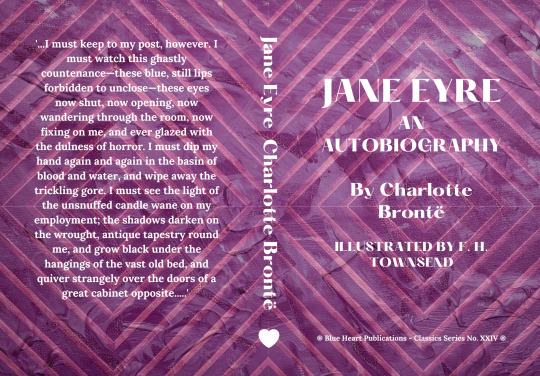
Charlotte Brontë's "Jane Eyre: An Autobiography" is an enduring literary masterpiece that transcends the boundaries of time and genre. As I immersed myself in the hauntingly beautiful narrative, I was captivated by Brontë's ability to craft a compelling story that delves into the complexities of love, identity, and societal expectations.
The title itself, "Jane Eyre: An Autobiography," sets the stage for a deeply personal and introspective journey. The novel unfolds as a first-person narrative, allowing readers a direct glimpse into the innermost thoughts and emotions of the protagonist, Jane Eyre. Brontë's decision to frame the story as an autobiography adds an intimate layer to the narrative, creating a profound connection between the reader and the resilient, independent, and fiercely intelligent Jane.
The novel begins with Jane's tumultuous childhood, marked by abuse and neglect at the hands of her aunt and cousins. Brontë paints a vivid picture of Jane's resilience and thirst for knowledge, setting the stage for a character who defies societal expectations and challenges the limitations placed upon her by her gender and social class. Jane's journey from the oppressive Lowood School to her position as a governess at Thornfield Hall is a testament to her indomitable spirit.
One of the most compelling aspects of "Jane Eyre" is the complex and evolving relationship between Jane and Mr. Rochester. Their connection is not a conventional fairy tale romance; rather, it is a nuanced exploration of love that transcends physical appearances and societal norms. Mr. Rochester, a brooding and enigmatic figure, becomes a symbol of Jane's struggle for autonomy and equality in a society that seeks to confine her to predetermined roles.
Brontë's prose is both eloquent and evocative, creating a rich tapestry of emotions and imagery. The novel's atmospheric descriptions contribute to the Gothic undertones, particularly as Jane navigates the mysterious corridors of Thornfield Hall and confronts the secrets concealed within its walls. The vivid landscapes and settings mirror the emotional landscapes of the characters, adding depth and resonance to the narrative.
Beyond the central love story, "Jane Eyre" grapples with profound themes of morality, religion, and the search for identity. Jane's moral compass is unwavering, and her internal conflicts with societal expectations and her own sense of right and wrong provide thought-provoking reflections on the human condition. The novel also addresses issues of class disparity, gender roles, and the constraints imposed on women in the 19th century.
In conclusion, "Jane Eyre: An Autobiography" is a literary tour de force that continues to captivate readers with its timeless themes and complex characters. Brontë's exploration of love, independence, and societal critique is as relevant today as it was in the Victorian era. As I closed the final pages, I marveled at the enduring power of Jane Eyre's story and the indelible mark it has left on the landscape of classic literature.
Charlotte Brontë's "Jane Eyre: An Autobiography" is available in Amazon in paperback 17.99$ and hardcover 25.99$ editions.
Number of pages: 476
Language: English
Rating: 8/10
Link of the book!
Review By: King's Cat
#Charlotte Brontë#Jane Eyre#Autobiographical novel#Victorian literature#Gothic romance#Strong female protagonist#Social critique#Love and independence#Mr. Rochester#Thornfield Hall#Gender roles#Morality and ethics#Resilience#Lowood School#Orphan narrative#Autonomy#Identity search#Class disparity#Governess role#Gothic elements#Enigmatic characters#Atmospheric descriptions#Internal conflicts#Feminist themes#Unconventional romance#Literary symbolism#Bildungsroman#Religion in literature#Psychological depth#Social norms
3 notes
·
View notes
Text
"Unveiling the Depths of the Soul: A Profound Exploration of 'Jane Eyre: An Autobiography' by Charlotte Brontë"

Charlotte Brontë's "Jane Eyre: An Autobiography" is an enduring literary masterpiece that transcends the boundaries of time and genre. As I immersed myself in the hauntingly beautiful narrative, I was captivated by Brontë's ability to craft a compelling story that delves into the complexities of love, identity, and societal expectations.
The title itself, "Jane Eyre: An Autobiography," sets the stage for a deeply personal and introspective journey. The novel unfolds as a first-person narrative, allowing readers a direct glimpse into the innermost thoughts and emotions of the protagonist, Jane Eyre. Brontë's decision to frame the story as an autobiography adds an intimate layer to the narrative, creating a profound connection between the reader and the resilient, independent, and fiercely intelligent Jane.
The novel begins with Jane's tumultuous childhood, marked by abuse and neglect at the hands of her aunt and cousins. Brontë paints a vivid picture of Jane's resilience and thirst for knowledge, setting the stage for a character who defies societal expectations and challenges the limitations placed upon her by her gender and social class. Jane's journey from the oppressive Lowood School to her position as a governess at Thornfield Hall is a testament to her indomitable spirit.
One of the most compelling aspects of "Jane Eyre" is the complex and evolving relationship between Jane and Mr. Rochester. Their connection is not a conventional fairy tale romance; rather, it is a nuanced exploration of love that transcends physical appearances and societal norms. Mr. Rochester, a brooding and enigmatic figure, becomes a symbol of Jane's struggle for autonomy and equality in a society that seeks to confine her to predetermined roles.
Brontë's prose is both eloquent and evocative, creating a rich tapestry of emotions and imagery. The novel's atmospheric descriptions contribute to the Gothic undertones, particularly as Jane navigates the mysterious corridors of Thornfield Hall and confronts the secrets concealed within its walls. The vivid landscapes and settings mirror the emotional landscapes of the characters, adding depth and resonance to the narrative.
Beyond the central love story, "Jane Eyre" grapples with profound themes of morality, religion, and the search for identity. Jane's moral compass is unwavering, and her internal conflicts with societal expectations and her own sense of right and wrong provide thought-provoking reflections on the human condition. The novel also addresses issues of class disparity, gender roles, and the constraints imposed on women in the 19th century.
In conclusion, "Jane Eyre: An Autobiography" is a literary tour de force that continues to captivate readers with its timeless themes and complex characters. Brontë's exploration of love, independence, and societal critique is as relevant today as it was in the Victorian era. As I closed the final pages, I marveled at the enduring power of Jane Eyre's story and the indelible mark it has left on the landscape of classic literature.
Charlotte Brontë's "Jane Eyre: An Autobiography" is available in Amazon in paperback 17.99$ and hardcover 25.99$ editions.
Number of pages: 476
Language: English
Rating: 8/10
Link of the book!
Review By: King's Cat
#Charlotte Brontë#Jane Eyre#Autobiographical novel#Victorian literature#Gothic romance#Strong female protagonist#Social critique#Love and independence#Mr. Rochester#Thornfield Hall#Gender roles#Morality and ethics#Resilience#Lowood School#Orphan narrative#Autonomy#Identity search#Class disparity#Governess role#Gothic elements#Enigmatic characters#Atmospheric descriptions#Internal conflicts#Feminist themes#Unconventional romance#Literary symbolism#Bildungsroman#Religion in literature#Psychological depth#Social norms
5 notes
·
View notes
Text
10 books to get to know me!
No one tagged me, but I want to do it, so there. Ha!
And Then There Were None- Agatha Christie GOLD. There are so many of hers I love, but this one takes the cake, best UHEA I have ever read, bar none. If you only read one Agatha Christie in your life, this is it. Consult me if you want more recs.
I Know Why the Caged Bird Sings- by Maya Angelou is such a richly told autobiography. Heartbreaking, beautiful, and captivating.
A Tale of Two Cities- Basically EVERYTHING by Charles Dickens is delectable, but nothing beats the scene of Sidney Carton going willingly to his doom. Do I love tragedy? I think I’m sensing a theme here.
Flowers for Algernon- by Daniel Keyes CHANGED MY BRAIN CHEMISTRY FOREVER. Seriously. This is a fucking masterpiece, told through the eyes of a mentally disabled man who gradually undergoes an experimental operation to increase his IQ.
Eleanor Oliphant is Completely Fine- by Gail Honeyman. What a beautiful, heartfelt story this was. Eleanor is endearing, wounded, and deeply troubled. I adored her transformation with my whole soul, and the discourse this opens about mental health and healing as a never-ending process.
The Choice: Embrace the Possible by Edith Eger. Holocaust stories never fail to break me, and this was no exception. I cried through this whole book, raged against everything evil and horrid the holocaust represented, and made me resolve to absorb the sadness into myself as a lesson on how to heal. Many sleepless nights over this one.
Invisible Women: Data Bias in a World Designed for Men- by Caroline Criado-Perez. This book angered me. I’m still angry about it. It was fucking brilliant, but I can’t stop seeing gender inequity in literally all aspects of life. The best part, it’s not an opinion piece. It’s all data delivered deadpan, and it’s shocking as hell. EVERYONE should read this.
How to Be an Antiracist- Ibram X Kendi, this book is one of my favorites about fighting racism, though there are a lot out there. This is just the one I keep returning back to again, and again.
Sourdough- by Robin Sloane. You may have heard of Mr. Penumbra’s 24 hour library, but THIS is the unsung hero in his published works. It’s a quirky love story about learning to enjoy life in all its flavor, turbulence, and catastrophe, in a world where everything is blah. Plus, I’m a sourdough baker, so I enjoyed the tall-tale aspects of sourdough starters in all their wild complexity. One of my favorite discoveries of all time.
Jane Eyre- by Charlotte Bronte. Jane Eyre gets a bad rep for so many reasons, but damn, this woman is my hero, in so many ways. I love this unremarkable, tenacious character with my whole soul. (and don’t talk to me about Mr. Rochester. Yes, we know he hid a whole WIFE in the attic, but remember, Jane LEAVES him to wander in the moors until she’s almost dead from hunger, and doesn’t go back until it’s on her terms. This woman is Goals.)
I seriously wish I could do more, but I will not oversaturate ;) tagging @the-francakes, @wolfpants, @vukovich, @nanneramma, @sliebman10, @foxfoots, @lumosatnight, @nv-md, @peachpety, @vdoshu, @lqtraintracks, @crazybutgood if you want to participate! (AND SERIOUSLY, it was so fun to go down memory lane. Join in if you want, I can’t always remember which mutuals like doing these things. Tag me and I’ll check out your list, too!)
16 notes
·
View notes
Text
Wow. There so much to unpack here, and as a HS teacher, I feel like I need to.
First of all, comparing pre-1970 English literature to German is ridiculous. Simply put, The Outsiders is not written in a different language. Neither are I Know Why the Caged Bird Sings, The Autobiography of Malcom X, or The Lord of the Rings. Also according to this claim, we should translate Fahrenheit 451, "Do Androids Dream of Electric Sheep?", and the entire Beatles canon.
But if your point is actually about Shakespeare (which it seems to be), then let's talk about Shakespeare.
While technically considered modern English, Shakespeare and his contemporaries are difficult to read because English has changed a lot since the seventeenth century, and we no longer have the context to understand all these words. For example, Shakespeare wrote a lot of dick jokes which are often lost on a contemporary audience that doesn't understand seventeenth century English slang.
But Shakespeare also used a lot of words and phrases that we use today. In fact, Shakespeare invented a lot of words and phrases that we use today. So being exposed to the original text not only helps students to better understand the language they are using, it shows them just how fluid language is--and always has been! Shakespeare coined new words all the time. You can too. The works of Shakespeare are a great example of linguistic productivity.
All this being said, we do translate Shakespeare. Sparknotes' No Fear Shakespeare editions are very popular in schools because they show the original text and a modern version side by side. So the students are exposed to the original text, but they're also not bogged down in it. When I was in school, I also had multiple teachers give us the assignment to make our own translations, either independently or in groups, depending the play and student skill level. And it's pretty easy to access hi-lo versions for struggling readers (some of which are just very very abridged) as well as graphic novel editions. There are options, and we use them.
But the age of a text isn't the only thing that makes it difficult to understand. Jane Eyre is a far easier read than Heart of Darkness, despite being published about 50 years earlier (which also happens to be about the same distance between today and 1970). Personally, I think Jane Eyre is also an easier read than No-No Boy, which came out in the 1950s.
Shakespeare uses a lot of poetry and uses figurative language. But half the English language is figurative language. Which is why exposure to Shakespeare is good for students--it can help them to understand idioms and metaphors, which we use all the time, many of which, as previously stated, originated with Shakespeare.
Finally, Shakespeare is difficult to read because, well... it's not meant to be read. It's meant to be performed. Which is why good English teachers do things like bringing in a box of props for students to incorporate into readers' theater and design costumes for the characters. Because studying a Shakespeare play by reading it is a little like studying Van Gogh through only written descriptions of his paintings.
Students don't hate literature because it's hard to read. They hate it because it's not salient. Therefore, we need to present texts in a relatable way, which can, but does not have to, include translation. For example:
--a college theater program presents "Shakespeare on the Rails" because when the characters are commuters on the train with you, the language is surprisingly easier to understand.
--A high school in the Marshall Islands puts on a production of A Midsummer Nights Dream, changing the setting and some of the charcters to fit Marshallese mythology, and translating the mechanicals' lines into Marshallese while keeping the nobles' lines in the original Shakespeare
--An HS teacher in the rural US uses the No Fear Shakespeare editions in her class and frontloads Romeo and Juliet with the knowledge that the characters are teenagers.
This last one was one of my co-workers and resulted in half a dozen ninth graders, in my classroom, complaining not about reading Romeo and Juliet, but about how immature and stupid the characters are. Does he really think he's in love? He thought he was in love with Rosalind yesterday! And the Friar told them they shouldn't rush to get married. They should have taken his advice. They're so stupid! (I had a similar event this year with eleventh graders complaining about what a b**** Abigail Williams is, even though The Crucible was not translated for them.)
Yes, translation is one tool we can use to make a text more accessible, which is why it's already actively being used in classrooms. But to assume it the either the only tool or the best tool (or that it's always necessary for something more then 50 years old) is both an insult to the intelligence of our students and an excuse for educators to be lazy.
We need to stop blaming the texts and start blaming the curricula, which, more often than not, use a read-the-text-answer-the-question method which is liable to bore anyone to tears. I didn't fall in love with Shakespeare in high school because I answered dozens of comprehension questions. I fell in love with Shakespeare in second grade. Watching Wishbone (which uses the original language).
youtube
Our school curricula are not designed in such a way as to make the texts relevent, nor do they invite students to engage with them on their own terms. Likewise, many teachers are never given the toolkit to do this (I know I wasn't!). But if we take the time to make the characters real and relevent, students buy into it. Sure, use the translation. But also show clips from The Complete Works of Shakespeare abridged or other adaptations. Invite students to create their own adaptations. And definitely, definitely, teach the dick jokes. Contrary to popular belief, teenagers like learning. They just don't like being talked down to.
(On that note, this is the same problem with the math curriculum. Students don't hate math because they "want to play with blocks." They hate math because abstract equations are not salient information. And quite frankly, playing with blocks sounds like a great way to teach geometry in a salient way. Blocks are, in fact, geometry.)

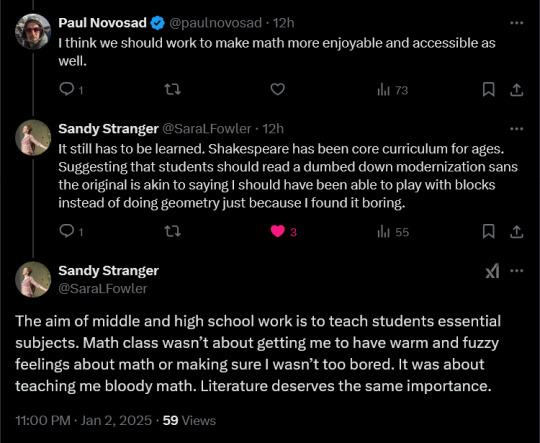
Novosad is an econ professor at Dartmouth btw
439 notes
·
View notes
Text
Jane Eyre
The book was originally published in three volumes as Jane Eyre: An Autobiography, with Currer Bell listed as the editor. Having only ever corresponded by letter, Brontë’s publisher Smith, Elder, and Company had no idea at first that Currer Bell was a woman.
10 things you might not know about Jane Eyre:
1 note
·
View note